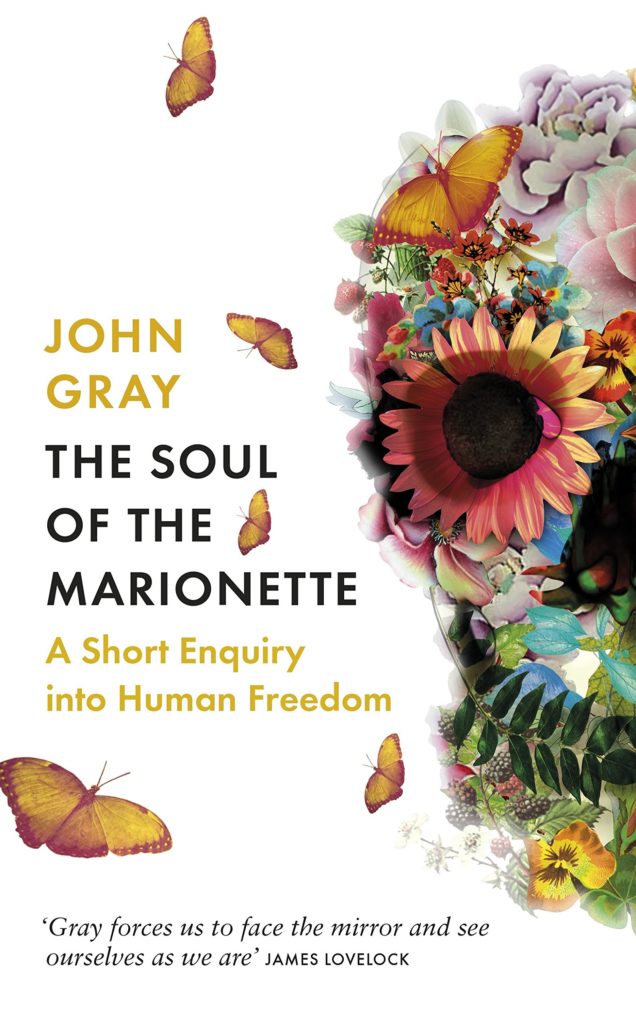I recently finished reading the excellent book The Soul of The Marionette by John Gray. I would put this book in the same genre as one of my other favorite books, Finite and Infinite Games. Both books are short metaphorical essays on progress in (human) life.

Here are my notes from the book.
1/ First of all, what is a marionette? It’s a puppet controlled by a human via strings from above. The reason it’s graceful in its movements is because it lacks self-awareness that it’s being controlled by someone else.
2/ Humans, unlike a marionette, are self-aware and hence always remain doubtful. The defining characteristic of humans is inner-conflict.
3/ Because we’re riddled with conflict, we’re the only animals whose heart leaps at fulfilling desires that we also simultaneously cast as evil.
4/ No other animal remains in conflict. They do what their heart desires with hesitation.
5/ If humans were infinitely aware, they wouldn’t hesitate. But because we’re only dimly conscious of our true selves – assuming it’s there – we remain in conflict.
6/ We have come to (wrongly) assume that such inner conflicts can be reduced and removed completely through the acquisition of knowledge.
7/ Modern-day science and corresponding techno-utopists strive to give human history meaning by seeking a sense of progress within it by increasing the amount of knowledge over time.
8/ In that way, science is an extension of religions like Christianity that promise redemption of humans at a point in the future when so and so is done (anti-aging research in case of science and return of prophet in religions)
9/ Both science and modern-day religions aim to provide the final word on the world. They systematically remove mystery and illusion from the human mind by explaining why good and evil exist.
10/ But the human soul resists the final word from either science or religion because that limits the freedom granted by self-awareness. The concept of determinism is incompatible with what’s felt by the soul in terms of its free-will.
11/ Nobody ultimately knows what animates the human soul and grants us consciousness. Truth is that, no matter how hard we may try to understand, it may be forever beyond our comprehension and the underlying reality may be inherently chaotic.
12/ Even though access to reality is beyond us, in the modern world, we behave as if we’re the masters of our own world and via knowledge, we can make a new world that’s better than the current one.
13/ We want to banish evil from the world but we forget that what we yearn for is meaning and that requires conflict – a battle between the good and the evil.
14/ Evil cannot be castigated from the world because we’re incapable of understanding why it exists and incapable of distancing ourselves from it.
15/ Not even science can explain evil because sometimes the reason for evil could be because it’s there. If evil is a consequence of a blind, random force like evolution, there’s no answer to why it exists. It just is.
16/ So, the enterprise of progress is bogus because whatever world we end up creating, we will create it in our own image. And we’re a conflicted species. Whatever animates us – both the good and the evil – is going to animate our creations as well.
17/ The most prominent example of this is our obsession with using technology and AI to replace ourselves. We believe that the world in which we don’t have to work is a good one but perhaps in that world we become as irrelevant as animals are in our world today.
18/ What is to guarantee that our tech creations won’t undergo a process of evolution and eventually become autonomous and beyond our control?
19/ A sense of progress requires faith in significance of humans in cosmic history. Nothing guarantees that. We may be completely irrelevant.
20/ Yet in a world hell-bent on human redemption, which history teaches is a foolish enterprise, the only way to maintain inner sanity is to have inner freedom.
21/ Such inner freedom requires giving up yearning for an everlasting meaning and simply accepting that meaning may come and go in our life at its own will.
22/ Inner freedom also requires a negative belief that there are some things that will forever remain beyond our comprehension.
23/ Our inner-conflict is proof that while we know the questions, we may never know the answers.
24/ In a world where nothing that cannot be explained, anything that happens must have a reason. Search for such reasons – which may be beyond our control because they’re random and blind – creates modern day anxiety.
25/ We need a belief in the unknowable and mystical to survive.
That’s it. The book touched on many topics on meaning and freedom. I highly recommend reading it.
Join 200k followers
Follow @paraschopra